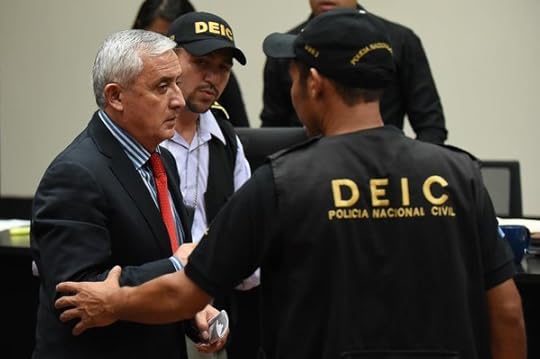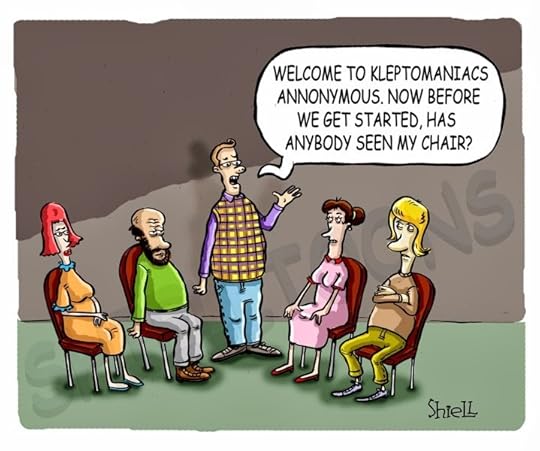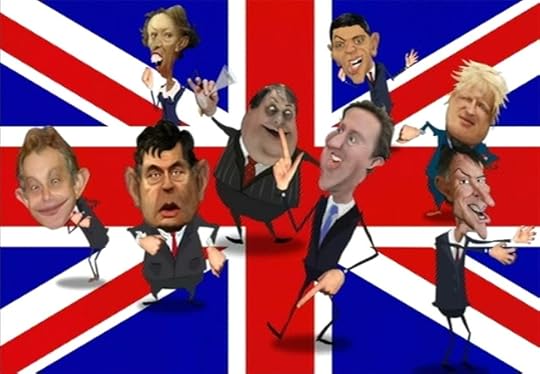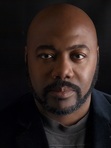Thomas Barr Jr.'s Blog, page 8
September 4, 2015
Otto P��rez Molina of Guatemala Is Jailed Hours After Resigning Presidency

By Azam Ahmed & Elisabeth Malkin
GUATEMALA
CITY — Just hours after tendering his resignation as president of Guatemala, Otto Pérez Molina was sent to jail to await the conclusion of a hearing examining his role in a multimillion-dollar customs fraud case that has shaken the nation and
sent reverberations throughout the region.
The decision to jail Mr. Pérez Molina highlighted the seismic
change sweeping through Guatemala after the corruption accusations in April, and offered a dramatic validation of a growing street demonstration movement demanding his ouster and prosecution.
For much of Guatemala’s violent history, marked by dictatorship and military repression, such a scene would have been unimaginable: a president forced to resign, then sit in open court to hear charges leveled against him and ultimately
spend the night in a prison he once might have overseen as a top general.
All that in the course of a single day.
Until now, Mr. Pérez Molina had given no indication that he would go gently. Over months, street
protests grew to include tens of thousands of citizens demanding that he step down over accusations that he played a major role in a multimillion-dollar fraud scheme. But still, the president — who was the military’s negotiator during
talks to end the nation’s bloody 36-year civil war — denied wrongdoing and refused to leave office. But just before midnight on Wednesday, Mr. Pérez Molina filed his resignation, saying he would “face justice and resolve my personal
situation.”
In the courtroom on Thursday, he listened calmly while prosecutors played wiretap recordings that they said implicated him as the leader of a vast
fraud ring. His face arranged in a look of alert composure, the now former president took notes as more than six hours of recordings played before judges, lawyers and the news media.
Afterward,
he paused to speak with reporters, proclaiming his innocence and pledging to face the allegations.
“It’s one thing to listen but another thing to investigate,”
he said, referring to the long day of taped conversations. “All Guatemalans have to respect the law, and I assure you I will respect the law and this process.”
When Mr. Pérez Molina left the courtroom, he passed a series of cells filled with those accused of being gang members and others facing their own hearings. Some of them began catcalling, whistling, throwing up gang signs and
shouting threats. He maintained the composure he had held during the hearing.
Outside, a modest but jubilant crowd filled the city’s central plaza, the nerve center
of the protest movement that began five months ago. A throng of vendors sold protest paraphernalia, hawking whistles, masks and Guatemalan flags for about $5. As a sporadic rain fell, the crowd passed the time the same way it had for months, with drums, chants
and blaring whistles.
The difference on Thursday was that the noise was characterized by celebration, not the outrage that had fueled it for months. The protesters’
goal of bringing down the president accomplished, the tenor was easygoing, even among the police. Where before hundreds of officers lined the perimeter of the plaza, on high alert, the contingent there on Thursday appeared relaxed, even relieved, at the events
transpiring before them.
“The powerful of this country never bothered to lift people from the street,” said Cifuentes Arreaga Sergio,
a 20-year veteran of the national civil police, who was stationed along the steps of the hulking Palacio Nacional.
Ignoring the occasional explosion
of confetti and the cacophony nearby, he betrayed a smile. “This was the only thing that the power of the state was going to respond to,” he said.
Mr. Pérez
Molina was sent to Matamoros prison, which is on a military base in central Guatemala City.
His vice president, Alejandro Maldonado, was sworn in as president on Thursday
afternoon, after Congress voted to accept the resignation. Mr. Maldonado demanded the resignations of top government officials, though many had already stepped down. His term will end in January, with the inauguration of the winner of elections that were scheduled
to begin on Sunday.
Mr. Pérez Molina, 64, is the first president in Guatemalan history to resign over a corruption scandal, experts said, a striking rarity in
a country long known for the impunity of its political establishment. And though the economy in Guatemala has lagged compared with those of other countries in Latin America, Mr. Pérez Molina’s sudden reversal of fortune put it firmly within a
wave of efforts elsewhere in the region to make political systems more accountable.
His reaction to the protests might itself be a signal of how much Guatemala has entered
a new era. Though Mr. Pérez Molina, who once ran the military’s feared intelligence operation, steadfastly ruled out resignation until the very end, his government never resorted to the sort of harsh measures that characteristically met public
dissent.
Yet major questions loom. Before the monumental challenge of transitioning from a system of impunity to one more responsive to its people
lies a more immediate one: Sunday’s election.
Mr. Pérez Molina’s sudden departure leaves almost no time to enact serious reforms before the transfer
of power. And the candidates for president were fielded in a world fundamentally different from the one that Guatemalans awoke to on Thursday.
“At their finest
moment, Guatemalans are faced with this really difficult choice between candidates who may not lead to the kinds of changes that people have been fighting for,” said Eric L. Olson, a scholar at the Mexico Institute of the Wilson Center. Not all Guatemalans
worried about the next steps. Indeed, the protesters seemed to possess a sort of euphoria marked by the belief that though they did not know their precise location, they were on the road to lasting change.
“We have people with capacity who can lead in these elections,” said Juan Gabon Villanueva, 56. “And if they’re corrupt, they will have to change their behavior.”
The political convulsions in Guatemala are part of a broader movement across Latin America, with discontent expressed through widespread protests
in Brazil, Chile, Peru, Ecuador and elsewhere.
Yet given Guatemala’s tragic history, the shifts here were already being seen as a dramatic example of a transformation
made against long odds. In neighboring Honduras, for instance, large demonstrations have also
ignited a debate about whether to adopt a model similar to Guatemala’s, in which an international team of investigators was deployed to bolster the nation’s law enforcement capacity.
Protesters reacted initially to the fraud scandal, in which millions of dollars were said to have been siphoned from customs revenue and contracts, but they also expressed deep frustrations over longstanding grievances:
hospitals that ran out of medicine, rising crime, and police forces that sometimes did not even have enough fuel to report to crime scenes.
The series of inquiries that
ignited the public’s rage were the work of an uncommon alliance of local prosecutors and investigators backed by the United Nations, known as the International Commission Against Impunity in Guatemala or by its Spanish-language acronym, Cicig.
Established in 2007 to help expose the ties between criminal networks and politicians, the commission eventually emboldened the nation’s own prosecutors to hold the elite
to account, and become a source of inspiration for many Guatemalans. For much of its history, Guatemalan society has been divided, its different constituencies fighting their battles alone. The nation’s indigenous population, which suffered the most
under the civil war, which killed about 200,000 people, has long struggled for equal rights with little success.
Yet the movement that began in April forged an unprecedented
alliance of different groups. Guatemala City’s middle class, long reluctant to speak out, began joining forces with peasant and indigenous groups. Eventually, the nation’s church and business leaders also took the side of the protesters to demand
change.
None of the candidates in the election had been expected to win 50 percent or more of the vote, making it likely that a runoff, tentatively scheduled for Oct.
25, would be necessary.
Protesters, however, have not been happy about their choices. The leading candidate, Manuel Baldizón, a businessman, is widely seen as
part of the discredited political system. His vice-presidential candidate faces charges in a separate corruption case, and Mr. Baldizón’s party had maintained a close alliance with Mr. Pérez Molina and his party.
The other leading candidates are Jimmy Morales, a comedian, and Sandra Torres, a former first lady.
The
disdain for the political options was palpable among protesters who gathered in the rain on Thursday. Some held signs bearing the name of the leading party upside down with a slash through it.
“We don’t want to follow the path created by the institutions that are controlled by the people we are trying to get rid of,” said Javier Gramajo Lopez, an early organizer of the protests. “If
Maldonado doesn’t hear the things we are saying, we will push him out too.”
August 21, 2015
Legalized Bribery

Story by Zep Teachout
LAST Thursday, Sheldon Silver, the speaker of the New York Assembly for the past 20 years,
was arrested and charged with mail and wire fraud, extortion and receiving bribes. According to Preet Bharara, the federal prosecutor who brought the charges, the once seemingly untouchable Mr. Silver took millions of dollars for legal work he did not do.
In exchange, he used his official power to steer business to a law firm that specialized in getting tax breaks for real estate developers, and he directed state funds to a doctor who referred cases to another law firm that paid Mr. Silver fees.
Albany is reeling, but fighting the kind of corruption that plagues not only New York State but the whole nation isn’t just about getting cuffs on the right guy. As with the recent conviction
of the former Virginia governor Bob McDonnell for receiving improper gifts and loans, a fixation on plain graft misses the more pernicious poison that has entered our system.
Corruption
exists when institutions and officials charged with serving the public serve their own ends. Under current law, campaign contributions are illegal if there is an explicit quid pro quo, and legal if there isn’t. But legal campaign contributions can be
as bad as bribes in creating obligations. The corruption that hides in plain sight is the real threat to our democracy.
Think of campaign contributions as the gateway
drug to bribes. In our private financing system, candidates are trained to respond to campaign cash and serve donors’ interests. Politicians are expected to spend half their time talking to funders and to keep them happy. Given this context, it’s
not hard to see how a bribery charge can feel like a technical argument instead of a moral one.
The former governor
of New York David A. Paterson, for example, said that he had trouble understanding where the criminality lay in the allegation that Mr. Silver accepted payments from law firms for referrals, including referrals by a doctor to whom Mr. Silver funneled state
health research funds. Mr. Paterson said, “in the legal profession, people refer business all the time. And theoretically, as a speaker, you could do that as well.”
The legal shades into the illegal. The real estate developers represented by the law firm that allegedly shuttled payments to Mr. Silver for fake legal services were also major campaign contributors. One developer mentioned in the charges
gave more than $10 million to political campaigns in the past decade, including $200,000 to Mr. Silver and his political action committees.
The structure of private
campaign finance has essentially pre-corrupted our politicians, so that they can’t even recognize explicit bribery because it feels the same as what they do every day. When you spend a lifetime serving campaign donors, it may seem easy to serve them
when they come with an outright bribe, because it doesn’t seem that different.
Mr. Silver retained such tight control over budgets and lawmaking
in Albany that his staffers were regarded as more powerful than most elected representatives. As a Democrat who cares about education, I can’t say that I loved seeing Mr. Silver, a great public school advocate, in handcuffs. For others, there’s
glee in seeing the perp walk. But one high-profile indictment does not represent the dawn of a new democracy.
We should take this moment to pursue
fundamental reform. We must reconstitute what it means to run for office and to serve in office. We need to ban outside income for elected officials. Transparency alone is not enough; it doesn’t solve the problem of creating outside dependencies. New
York lawmakers can’t carry water for two masters when in office.
Recent Comments Kenan Porobic January 26, 2015
Our problem
isn’t that our politicians are corrupted. Our problem is that both our politicians are our free press are corrupted. Both groups...
Rereading Zephyr Teachout's call
for limitations on campaign financing, it occurs to me that one of the targets overlooked in making...
I appreciate all the suggestions for possible changes to the system
which people have put forth. If implemented, I imagine a number of them...
We should reject the private financing of campaigns as the only model. We need to provide enough public funding for campaigns so that anyone with a broad base of support can run for office, and respond effectively
to attacks, without becoming dependent on private patrons. Running for office shouldn’t be a job defined by permanent begging at the feet of the wealthiest donors in the country.
Continue reading the main storyWrite A Comment
Those two reforms would be transformational. We will never eradicate every shady deal, but we can make politics more about serving the public and less like legalized bribery.
There’s one last thing we should do: ban corporate spending and limit total campaign spending. Last week not only saw Mr. Silver in handcuffs, it also marked the fifth anniversary of the Citizens United ruling, in which the Supreme
Court decided that outside corporate spending was in no way corrupting. We will have to revisit that decision, but we don’t need to wait for the court to act.
Corruption is about greed and private interests put ahead of the public good. Whether influence is bought through a bribe, outside spending, outside income or campaign contributions, the public suffers in the same way. Until we move past
scandals toward structural change, our democracy will suffer, too.
August 14, 2015
Fresh leaks reveal outrageous corruption among political leaders

By article by Press TV
An unprecedented leak of documents has disclosed outrageous financial corruption among prominent political
figures and billionaires across the world. A collection of 2.5 million records obtained by the International Consortium of Investigative Journalists (ICIJ) -- a global network of journalists from more than 60 countries -- has unmasked high ranking politicians,
arms dealers and other famous individuals from 170 countries operating under the cover of private trusts and businesses in the British Virgin Islands, the Cook Islands and other offshore locations. The list includes famous names such as Azeri President Ilham
Aliyev and his family, the daughter of Philippines’ former dictator Ferdinand Marcos, and Baroness Carmen Thyssen-Bornemisza, who is one of the most prominent art collectors in the world. The ICIJ, in collaboration with 86 journalists from 46 countries,
obtained the information from the contents of emails and accounting records accumulated over a period of 30 years. The leaks, which shed light only on the covert activities of 122,000 offshore companies and 120,000 lawyers, brokers and accountants, are just
a prelude to future revelations about tax havens. Extra information has been promised to be exposed to public opinion in the coming weeks. Such a widespread investigation by 40 papers and news organizations from across the globe around “Offshore Leaks”
project is unprecedented in the history of world’s journalism and is a real declaration of war on tax havens. The time is conducive to laying bare the scandals of corrupt politicians, international traffickers, Mafia gangs and tax-evading rich people.
“I've never seen anything like this. This secret world has finally been revealed,” said Arthur Cockfied, law professor and tax expert at Queens University in Canada, who has seen the documents. There is no clear definition for a tax haven. Nor
is it clear under what conditions an island, archipelago or a country would be recognized as a tax haven. Analysts slam offshore tax havens for promoting global corruption by enabling the wealthy to evade payment of taxes and thus shifting the burden onto
the ordinary public. Offshore tax havens also enable corrupt officials to loot national treasuries and cover up the activities of global crime syndicates. The annual flow of global proceeds of financial crimes to offshore tax havens stands at 1.6 trillion
US dollars. In a bid to protect the identities of the real owners of companies, offshore services firms usually appoint fake directors and shareholders to confuse investigators. A study by James S. Henry, former chief economist at McKinsey & Company, and
a board member of the Tax Justice Network, shows that the estimated amount of 32 trillion US dollars stashed away in offshore havens is roughly equivalent to the size of the US and Japanese economies combined, and that half of the amount belongs to 91,000
individuals. While the economies of the Western countries are shrinking, Henry’s study shows that offshore funds continue to burgeon, with assets managed by the world’s 50 largest "private banks" that provide access to offshore financial services,
growing from 5.4 trillion US dollars in 2005 to above 12 trillion US dollars in 2010. The ICIJ’s study estimated that offshore accounts hold more than 20 trillion US dollars. According to the International Monetary Fund (IMF), 50 percent of international
financial transactions are carried out through the offshore tax havens and the value of the assets of the companies located in these places exceeds 7 trillion US dollars. Tax havens are also home to over 4,000 banks and two-thirds of the world’s investment
funds, the IMF says. ASH/KA/MHB
August 7, 2015
Europe���s impatience with misbehaviour drives corruption crackdown
 Story by Tony Barber Romanian prosecutors accuse a former finance minister of stashing three gold bars, $90,000 in cash and a French impressionist artwork in a safe at a friend’s home. A Spanish high court judge asserts that
Story by Tony Barber Romanian prosecutors accuse a former finance minister of stashing three gold bars, $90,000 in cash and a French impressionist artwork in a safe at a friend’s home. A Spanish high court judge asserts thatthe ruling Popular party (PP) engaged in illegal financing activities from 1990 to 2008, and that the case should go to trial.
In Italy, the transport minister resigns after dozens of government officials and businessmen are placed under investigation,
suspected of involvement in rigged public works contracts worth €25bn. Meanwhile, Britain’s anti-establishment UK Independence party expels one of its European Parliament legislators for an alleged attempt to fiddle a restaurant expenses bill.
The lesson from these four incidents, each of which occurred this month, is that prosecutors, judges and even political leaders themselves are, in much of Europe, becoming more serious about uncovering and punishing corruption. Pope Francis got in on the act last week, visiting a notoriously lawless Naples neighbourhood and urging its residents to summon the courage to “clean up the city
and clean up society, so that there is no longer that stink of corruption”.
In principle, the political and legal assault on corruption ought to strengthen Europe in its unwanted but increasingly inescapable confrontation with Russia. For corruption scandals that discredit European politics are a gift to propagandists in Moscow, who scoff at the supposed degeneracy of Europe’s political
systems and ethical values.
Europe’s crackdown on corruption, though still patchy, amounts to a recognition that — in an age of burst property bubbles, failed banks and government-imposed austerity — society is losing its patience
with misbehaviour on the part of its rulers. For mainstream politicians, a failure to tackle corruption, or to be seen as trying to tackle it, risks driving voters into the camps of rightwing and leftwing populist parties.
From Ireland to Cyprus, politicians
who cheat the public go down badly with Europeans afflicted by unemployment, debt and squeezed or falling living standards. In countries with political systems penetrated by clientelism, the public’s lower tolerance for corruption may partly reflect
the fact that, in hard economic times, political parties have less largesse to distribute to voters in jobs and perks.
Disgust with corruption is a key factor in the rise of Podemos, a radical leftist party which tops some Spanish opinion polls, threatening an upset in the national election due by the year’s end. Pablo Ruz,
a high court judge who has spent years delving into secret funds alleged to have been under the PP’s control, said in a report this month that the party “made use of various forms of financing outside the legal economic framework” for at
least 18 years.
Corruption was the big issue that propelled Beppe Grillo’s Five-Star Movement to a startling 25 per
cent share of the vote in Italy’s 2013 election. A classic protest party rather than one ambitious to exercise power itself, the Five-Star Movement has faded somewhat since Matteo
Renzi became prime minister a year ago — arguably, because his anti-corruption rhetoric sounds less empty than that of earlier generations of Italian politicians.
His government has boosted the powers of Anac, the anti-corruption
agency led by Raffaele Cantone, a former magistrate. Standards of integrity are higher in Mr Renzi’s government, too. Maurizio
Lupi resigned as transport minister last week, even though he is not under investigation in the public works scandal.
The biggest transformation has occurred in Romania, where Darius Valcov resigned this month as finance
minister, becoming the nation’s highest-level sitting politician to be investigated for corruption. A crackdown started in earnest last year, with over 1,100 convicted of graft, and has gathered pace since the election in November of Klaus Iohannis as Romania’s president.
All over Europe, far more needs to be
done. But the economic crisis, the emergence of anti-establishment politics and the contest with Russia are raising awareness that corruption is, over time, a danger to the rule of law and democracy itself.



